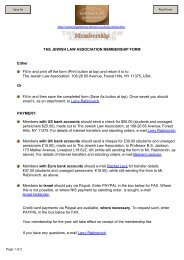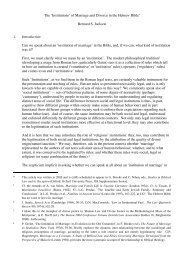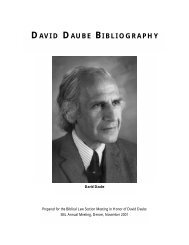Here - Deborah Charles Publications
Here - Deborah Charles Publications
Here - Deborah Charles Publications
Create successful ePaper yourself
Turn your PDF publications into a flip-book with our unique Google optimized e-Paper software.
- 26 –between the central and peripheral communities in Yemen and the authority and influence the Beit-Din in San’a had over the otherJewish communities in Yemen. The position of San’a’s yeshiva is further clarified in document 4, as it is written: “And on thiseight rabbis of the yeshiva signed,” as well as, “And this is with the agreement of all yeshivas.”The appeal of the Jews to the Gentile courts—though forbidden by Torah law—is seen throughout a number of thedocuments. Women from the community of Rada and the surrounding area demanded their monetary rights by appealing toMuslim judges in cases they assumed that Islamic law would benefit them more than Jewish law would. Eventually, these caseswere decided by the ruling of a Jewish judge (documents 7-8). Similarly, in the community of Rasba the heirs of the yabbamturned to Gentile courts to settle the inheritance (document 5).The rabbis of Yemen encouraged performing the commandment of yibbum, for it was hard for them to see women whowere Agunot. The result of this was that in certain cases the rabbis would invest great effort to relocate a missing yabbam,regardless if it was in Yemen or in cities where Yemenite Jews would frequent (document 9).It should be noted that when it was necessary for the head of the Beit-Din of Ra a, the second greatest community inYemen, to perform a chalitzah in a specific scenario (document 7), there was no precedent to this case or evidence from the timehis father was head of the Beit-Din, and thus he learned from Halacha itself how to perform the act. This highlights the fact thatthere was a preference to perform yibbum and that performing chalitzah was rare in Yemen.Prof. Aharon Gaimani lectures at the Jewish Studies Department at Bar-Ilan University. He is active in teaching and researchin the field of Jewish life in Muslim lands. He has published many articles in this field on the following subjects, amongothers: rabbinical court proceedings, activity of rabbinical emissaries, marriage contracts and bills of divorce, wills offamous leaders, the Jewish woman, proper and family names, manuscripts and colophons. In 2005 his book “Changes in theHeritage of Yemenite Jewry Under the Influence of the Shulhan `Arukh and the Kabbalah of R. Yitshaq Luria” waspublished by the Bar-Ilan University Press.Marc GaryMarc Gary (Jewish Theological Seminary) – Donations of Ill-Gotten Gain in Jewish and American Law (Session 9A): for Abstract,se Elliot Dorff, aboveMarc Gary is the Executive Vice Chancellor and Chief Operating Officer of the Jewish Theological Seminary. Hepreviously served as Executive Vice President and General Counsel of Fidelity Investments and of BellSouth Corporation.From 1990 to 1993, he was a special prosecutor in the Office of Independent Counsel. For almost twenty years, he was alitigation partner in the international law firm of Mayer Brown & Platt (now Mayer Brown LLP). He graduated with a JDdegree from Georgetown University Law Center and is a long-time member of the Conservative Movement's Committeeon Jewish Law and Standards. Israel Zvi GilatIsrael Zvi Gilat (Netanya Academic College), Confiscation of Property during Conquest: A Capricious Act? (Session 6A)The Torah, from a doctrinal point of view, was given on Mount Sinai. with all oral rules including the power of the sages to draftthe specific ordinance “hefker beith-din hefker”, which allows a rabbinical court to declare property ownerless. Such confiscatingproperty while ignoring the owner's consent, is not a capricious prerogative but rather reflects the sages' conception of what is rightand fitting before God. Also "dina d'malkhuta dina", which allows Crown agents to confiscate property from one Jew and give it toanother, according to the Babylonian Talmud and its commentators, is only valid if it is carried out in a fair and egalitarian mannertowards all citizens.It would seem that the Radbaz and the Rashbatz are of the opinion that confiscations due to "kibbush mil ama" do nothave to be fair and egalitarian, but may be capricious acts of a capricious king, either out of vengeance or greed, even if there is noobvious advantage for his subjects. Is this equivalent to the principle: “The King Can Do No Wrong”? Is this assumption onlyapplicable during war?Dr. Israel Zvi Gilat, Rabbi, Lawyer, Ph.D. in Law, Bar-Ilan University is a Senior Lecturer at the Law School, NetanyaAcademic College, Netanya, Israel; Lecturer at the School of Education, Bar-Ilan University, Israel. His research interests





